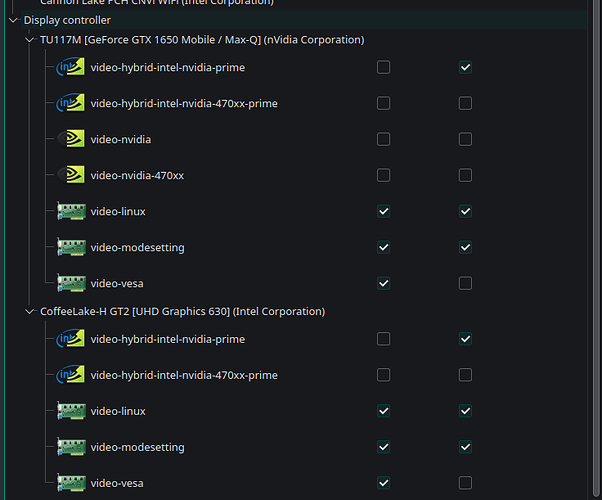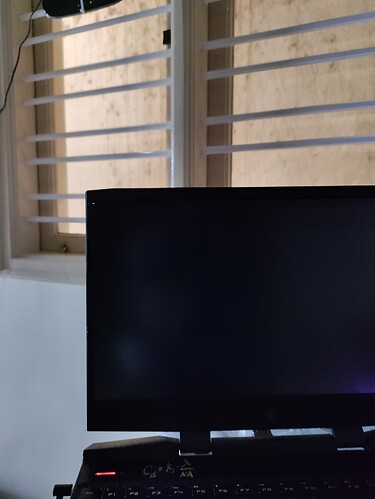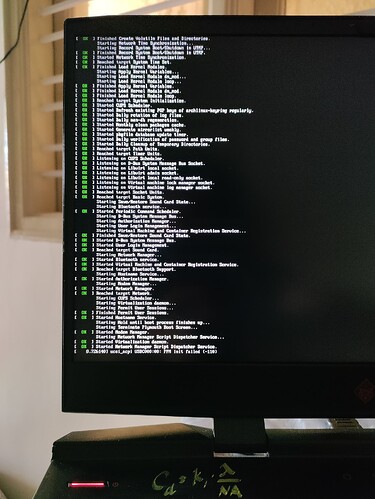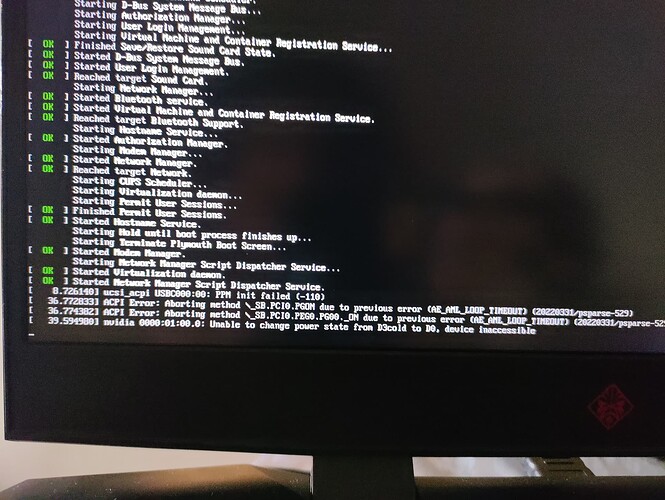My laptop is an HP Omen 15 with KDE manjaro and win11 dual boot ( I have added output of inxi --admin --verbosity=7 --filter --no-host --width below) (I use windows rarely and only for some light gaming)
I has been using the free nouveu driver so far. I got an external monitor the other day and I had to switch to the nvidia driver (I just used the install proprietary driver option in the settings app, see screenshot) because there was too much tearing on the external monitor video (especially when playing video/ dragging a window etc).
My laptop now randomly freezes from time to time when booting. When this happens the system becomes completely unresponsive (not even REISUB works it seems). Once this happens it just ends up freezing even after I reboot and the only solution is to boot into windows and the shutdown and boot back into linux. This freezing does not happen always, only occasionally.
I think I also spotted some line saying “PPM init failed” in one boot log (from journalctl)
System:
Kernel: 6.1.41-1-MANJARO arch: x86_64 bits: 64 compiler: gcc v: 13.1.1
parameters: BOOT_IMAGE=/boot/vmlinuz-6.1-x86_64
root=UUID=38fd7989-2606-41e1-b018-3ec8243f181d rw quiet splash
udev.log_priority=3
Desktop: KDE Plasma v: 5.27.6 tk: Qt v: 5.15.10 wm: kwin_x11 vt: 2 dm: SDDM
Distro: Manjaro Linux base: Arch Linux
Machine:
Type: Laptop System: HP product: OMEN by HP Laptop 15-dc1xxx v: N/A
serial: <superuser required> Chassis: type: 10 serial: <superuser required>
Mobo: HP model: 8575 v: 21.17 serial: <superuser required> UEFI: AMI
v: F.25 date: 07/19/2022
Battery:
ID-1: BAT0 charge: 1.1 Wh (50.0%) condition: 2.2/2.2 Wh (100.0%) volts: 12.8
min: 11.6 model: HP Primary type: Li-ion serial: N/A status: not charging
Memory:
System RAM: total: 16 GiB available: 15.43 GiB used: 4.03 GiB (26.1%)
RAM Report: permissions: Unable to run dmidecode. Root privileges required.
CPU:
Info: model: Intel Core i7-9750H bits: 64 type: MT MCP arch: Coffee Lake
gen: core 9 level: v3 note: check built: 2018 process: Intel 14nm family: 6
model-id: 0x9E (158) stepping: 0xA (10) microcode: 0xF2
Topology: cpus: 1x cores: 6 tpc: 2 threads: 12 smt: enabled cache:
L1: 384 KiB desc: d-6x32 KiB; i-6x32 KiB L2: 1.5 MiB desc: 6x256 KiB
L3: 12 MiB desc: 1x12 MiB
Speed (MHz): avg: 1450 high: 2600 min/max: 800/4500 scaling:
driver: intel_pstate governor: powersave cores: 1: 2600 2: 2600 3: 888 4: 899
5: 800 6: 2600 7: 900 8: 900 9: 900 10: 900 11: 2600 12: 822
bogomips: 62431
Flags: 3dnowprefetch abm acpi adx aes aperfmperf apic arat
arch_capabilities arch_perfmon art avx avx2 bmi1 bmi2 bts clflush
clflushopt cmov constant_tsc cpuid cpuid_fault cx16 cx8 de ds_cpl dtes64
dtherm dts epb ept ept_ad erms est f16c flexpriority flush_l1d fma fpu
fsgsbase fxsr ht hwp hwp_act_window hwp_epp hwp_notify ibpb ibrs ida
intel_pt invpcid invpcid_single lahf_lm lm mca mce md_clear mmx monitor
movbe mpx msr mtrr nonstop_tsc nopl nx pae pat pbe pcid pclmulqdq pdcm
pdpe1gb pebs pge pln pni popcnt pse pse36 pti pts rdrand rdseed rdtscp
rep_good sdbg sep smap smep ss ssbd sse sse2 sse4_1 sse4_2 ssse3 stibp
syscall tm tm2 tpr_shadow tsc tsc_adjust tsc_deadline_timer vme vmx vnmi
vpid x2apic xgetbv1 xsave xsavec xsaveopt xsaves xtopology xtpr
Vulnerabilities:
Type: itlb_multihit status: KVM: VMX disabled
Type: l1tf mitigation: PTE Inversion; VMX: conditional cache flushes, SMT
vulnerable
Type: mds mitigation: Clear CPU buffers; SMT vulnerable
Type: meltdown mitigation: PTI
Type: mmio_stale_data mitigation: Clear CPU buffers; SMT vulnerable
Type: retbleed mitigation: IBRS
Type: spec_store_bypass mitigation: Speculative Store Bypass disabled via
prctl
Type: spectre_v1 mitigation: usercopy/swapgs barriers and __user pointer
sanitization
Type: spectre_v2 mitigation: IBRS, IBPB: conditional, STIBP: conditional,
RSB filling, PBRSB-eIBRS: Not affected
Type: srbds mitigation: Microcode
Type: tsx_async_abort status: Not affected
Graphics:
Device-1: Intel CoffeeLake-H GT2 [UHD Graphics 630] vendor: Hewlett-Packard
driver: i915 v: kernel arch: Gen-9.5 process: Intel 14nm built: 2016-20
ports: active: eDP-1 empty: DP-1,HDMI-A-1 bus-ID: 00:02.0
chip-ID: 8086:3e9b class-ID: 0300
Device-2: NVIDIA TU117M [GeForce GTX 1650 Mobile / Max-Q]
vendor: Hewlett-Packard driver: nvidia v: 535.86.05
alternate: nouveau,nvidia_drm non-free: 535.xx+
status: current (as of 2023-07) arch: Turing code: TUxxx
process: TSMC 12nm FF built: 2018-22 pcie: gen: 1 speed: 2.5 GT/s lanes: 8
link-max: gen: 3 speed: 8 GT/s lanes: 16 bus-ID: 01:00.0 chip-ID: 10de:1f91
class-ID: 0300
Device-3: Cheng Uei Precision Industry (Foxlink) HP Wide Vision HD
Integrated Webcam driver: uvcvideo type: USB rev: 2.0 speed: 480 Mb/s
lanes: 1 mode: 2.0 bus-ID: 1-6:4 chip-ID: 05c8:03bc class-ID: 0e02
Display: x11 server: X.Org v: 21.1.8 compositor: kwin_x11 driver: X:
loaded: modesetting,nvidia unloaded: nouveau alternate: fbdev,nv,vesa
dri: iris gpu: i915 display-ID: :0 screens: 1
Screen-1: 0 s-res: 3840x1080 s-dpi: 96 s-size: 1013x285mm (39.88x11.22")
s-diag: 1052mm (41.43")
Monitor-1: HDMI-1-0 pos: primary,right res: 1920x1080 hz: 60 dpi: 93
size: 527x296mm (20.75x11.65") diag: 604mm (23.8") modes: N/A
Monitor-2: eDP-1 pos: left res: 1920x1080 hz: 60 dpi: 142
size: 344x193mm (13.54x7.6") diag: 394mm (15.53") modes: N/A
API: OpenGL v: 4.6 Mesa 23.0.4 renderer: Mesa Intel UHD Graphics 630 (CFL
GT2) direct-render: Yes
Audio:
Device-1: Intel Cannon Lake PCH cAVS vendor: Hewlett-Packard
driver: snd_hda_intel v: kernel alternate: snd_soc_skl,snd_sof_pci_intel_cnl
bus-ID: 00:1f.3 chip-ID: 8086:a348 class-ID: 0403
Device-2: NVIDIA vendor: Hewlett-Packard driver: snd_hda_intel v: kernel
pcie: gen: 1 speed: 2.5 GT/s lanes: 8 link-max: gen: 3 speed: 8 GT/s
lanes: 16 bus-ID: 01:00.1 chip-ID: 10de:10fa class-ID: 0403
API: ALSA v: k6.1.41-1-MANJARO status: kernel-api with: aoss
type: oss-emulator tools: alsactl,alsamixer,amixer
Server-1: JACK v: 1.9.22 status: off tools: N/A
Server-2: PipeWire v: 0.3.75 status: active with: 1: pipewire-pulse
status: active 2: wireplumber status: active 3: pipewire-alsa type: plugin
tools: pactl,pw-cat,pw-cli,wpctl
Network:
Device-1: Intel Cannon Lake PCH CNVi WiFi driver: iwlwifi v: kernel
bus-ID: 00:14.3 chip-ID: 8086:a370 class-ID: 0280
IF: wlo1 state: up mac: <filter>
IP v4: <filter> type: dynamic noprefixroute scope: global
broadcast: <filter>
IP v6: <filter> type: noprefixroute scope: link
Device-2: Realtek RTL8111/8168/8411 PCI Express Gigabit Ethernet
vendor: Hewlett-Packard driver: r8169 v: kernel pcie: gen: 1 speed: 2.5 GT/s
lanes: 1 port: 3000 bus-ID: 03:00.0 chip-ID: 10ec:8168 class-ID: 0200
IF: eno1 state: down mac: <filter>
WAN IP: <filter>
Bluetooth:
Device-1: Intel Bluetooth 9460/9560 Jefferson Peak (JfP) driver: btusb v: 0.8
type: USB rev: 2.0 speed: 12 Mb/s lanes: 1 mode: 1.1 bus-ID: 1-14:5
chip-ID: 8087:0aaa class-ID: e001
Report: rfkill ID: hci0 rfk-id: 0 state: up address: see --recommends
Logical:
Message: No logical block device data found.
RAID:
Hardware-1: Intel 82801 Mobile SATA Controller [RAID mode] driver: ahci
v: 3.0 port: 5060 bus-ID: 00:17.0 chip-ID: 8086:282a rev: N/A class-ID: 0104
Drives:
Local Storage: total: 1.14 TiB used: 149.41 GiB (12.8%)
SMART Message: Unable to run smartctl. Root privileges required.
ID-1: /dev/nvme0n1 maj-min: 259:0 vendor: Samsung model: MZVLB256HAHQ-000H1
size: 238.47 GiB block-size: physical: 512 B logical: 512 B speed: 31.6 Gb/s
lanes: 4 tech: SSD serial: <filter> fw-rev: EXD70H1Q temp: 34.9 C
scheme: GPT
ID-2: /dev/sda maj-min: 8:0 vendor: Crucial model: CT1000BX500SSD1
size: 931.51 GiB block-size: physical: 512 B logical: 512 B speed: 6.0 Gb/s
tech: SSD serial: <filter> fw-rev: 030 scheme: GPT
Message: No optical or floppy data found.
Partition:
ID-1: / raw-size: 238.17 GiB size: 233.38 GiB (97.99%)
used: 122.98 GiB (52.7%) fs: ext4 dev: /dev/nvme0n1p2 maj-min: 259:2
label: N/A uuid: 38fd7989-2606-41e1-b018-3ec8243f181d
ID-2: /boot/efi raw-size: 300 MiB size: 299.4 MiB (99.80%)
used: 316 KiB (0.1%) fs: vfat dev: /dev/nvme0n1p1 maj-min: 259:1 label: N/A
uuid: A8B1-78C4
ID-3: /home/<filter>/projects raw-size: 200 GiB size: 195.8 GiB (97.90%)
used: 26.43 GiB (13.5%) fs: ext4 dev: /dev/sda5 maj-min: 8:5 label: N/A
uuid: ba3b08ea-a90a-4bf9-8b87-cf3e1bdc133c
Swap:
Kernel: swappiness: 60 (default) cache-pressure: 100 (default)
ID-1: swap-1 type: file size: 512 MiB used: 26.5 MiB (5.2%) priority: -2
file: /swapfile
Unmounted:
ID-1: /dev/sda1 maj-min: 8:1 size: 100 MiB fs: vfat label: N/A
uuid: AAEA-C433
ID-2: /dev/sda2 maj-min: 8:2 size: 16 MiB fs: <superuser required>
label: N/A uuid: N/A
ID-3: /dev/sda3 maj-min: 8:3 size: 199.24 GiB fs: ntfs label: N/A
uuid: 78EE7BD4EE7B88E0
ID-4: /dev/sda4 maj-min: 8:4 size: 663 MiB fs: ntfs label: N/A
uuid: 18C60466C604468A
ID-5: /dev/sda6 maj-min: 8:6 size: 222.23 GiB fs: ntfs label: N/A
uuid: E022816B2281478C
ID-6: /dev/sda7 maj-min: 8:7 size: 309.29 GiB fs: ntfs label: last volume
uuid: F4568E09568DCD34
USB:
Hub-1: 1-0:1 info: hi-speed hub with single TT ports: 16 rev: 2.0
speed: 480 Mb/s (57.2 MiB/s) lanes: 1 mode: 2.0 chip-ID: 1d6b:0002
class-ID: 0900
Device-1: 1-1:2 info: Microdia USB DEVICE type: keyboard,mouse
driver: hid-generic,usbhid interfaces: 2 rev: 2.0 speed: 12 Mb/s (1.4 MiB/s)
lanes: 1 mode: 1.1 power: 100mA chip-ID: 0c45:8513 class-ID: 0301
Device-2: 1-2:3 info: Sunplus Innovation Gaming mouse [Philips SPK9304]
type: mouse driver: hid-generic,usbhid interfaces: 1 rev: 2.0
speed: 1.5 Mb/s (183 KiB/s) lanes: 1 mode: 1.0 power: 98mA
chip-ID: 1bcf:08a0 class-ID: 0301
Device-3: 1-6:4 info: Cheng Uei Precision Industry (Foxlink) HP Wide
Vision HD Integrated Webcam type: video driver: uvcvideo interfaces: 2
rev: 2.0 speed: 480 Mb/s (57.2 MiB/s) lanes: 1 mode: 2.0 power: 500mA
chip-ID: 05c8:03bc class-ID: 0e02
Device-4: 1-14:5 info: Intel Bluetooth 9460/9560 Jefferson Peak (JfP)
type: bluetooth driver: btusb interfaces: 2 rev: 2.0
speed: 12 Mb/s (1.4 MiB/s) lanes: 1 mode: 1.1 power: 100mA
chip-ID: 8087:0aaa class-ID: e001
Hub-2: 2-0:1 info: super-speed hub ports: 8 rev: 3.1
speed: 10 Gb/s (1.16 GiB/s) lanes: 1 mode: 3.2 gen-2x1 chip-ID: 1d6b:0003
class-ID: 0900
Sensors:
System Temperatures: cpu: 51.0 C pch: 46.0 C mobo: N/A
Fan Speeds (RPM): cpu: 2013 fan-2: 0
Info:
Processes: 295 Uptime: 12m wakeups: 1 Init: systemd v: 253 default: graphical
tool: systemctl Compilers: gcc: 13.1.1 clang: 15.0.7 Packages: 1443
pm: pacman pkgs: 1437 libs: 377 tools: pamac,yay pm: flatpak pkgs: 6
Shell: Zsh v: 5.9 default: Bash v: 5.1.16 running-in: konsole inxi: 3.3.28





